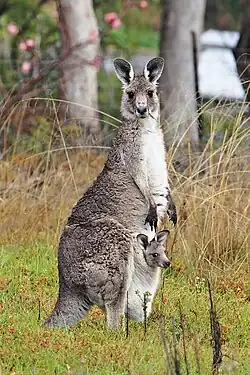袋鼠
Chinese
FWOTD – 5 November 2020
a pouch; bag; sack a pouch; bag; sack; pocket |
rat; mouse | ||
|---|---|---|---|
| trad. (袋鼠) | 袋 | 鼠 | |
| simp. #(袋鼠) | 袋 | 鼠 | |

袋鼠
Pronunciation
Noun
袋鼠
- kangaroo (Classifier: 隻/只)
- 有一天,動物園裡的袋鼠「越獄」成功了,動物園的管理員們如臨大敵,召開了一個緊急會議,討論為什麼袋鼠會逃跑成功,有一個員工認為是籠子高度太低,而讓袋鼠爬走了。 [MSC, trad.]
- From: 2010, 高紹軒, 《天啊!我把薪水變多了》, page 55
- Yǒu yī tiān, dòngwùyuán lǐ de dàishǔ “yuèyù” chénggōng le, dòngwùyuán de guǎnlǐyuánmen rúlíndàdí, zhàokāi le yī ge jǐnjí huìyì, tǎolùn wèishénme dàishǔ huì táopǎo chénggōng, yǒu yī ge yuángōng rènwéi shì lóngzi gāodù tài dī, ér ràng dàishǔ pá zǒu le. [Pinyin]
- One day, a kangaroo in the zoo successfully "escaped from prison". The zookeepers kept their guards up and convened for an emergency meeting to discuss why the kangaroo succeeded in escaping. One of the staff members thought that the cage was too short and allowed the kangaroo to crawl out.
有一天,动物园里的袋鼠「越狱」成功了,动物园的管理员们如临大敌,召开了一个紧急会议,讨论为什么袋鼠会逃跑成功,有一个员工认为是笼子高度太低,而让袋鼠爬走了。 [MSC, simp.]
Japanese
| Kanji in this term | |
|---|---|
| 袋 | 鼠 |
| ふくろ Grade: S |
ねずみ Hyōgaiji |
| kun’yomi | |
Etymology
Compound of 袋 (fukuro, “bag”) + 鼠 (nezumi, “mouse, rat”).[1][2][3][4]
First cited to a biology glossary from 1884.[2]
Noun
袋鼠 • (fukuro nezumi)
References
- Shinmura, Izuru, editor (1998), 広辞苑 [Kōjien] (in Japanese), Fifth edition, Tōkyō: Iwanami Shoten, →ISBN
- “袋鼠”, in 日本国語大辞典 (Nihon Kokugo Daijiten, “Nihon Kokugo Daijiten”) (in Japanese), concise edition, Tōkyō: Shogakukan, 2000
- “袋鼠”, in デジタル大辞泉 [Digital Daijisen] (in Japanese), Tōkyō: Shogakukan, updated roughly every four months
- Matsumura, Akira, editor (2006), 大辞林 [Daijirin] (in Japanese), Third edition, Tōkyō: Sanseidō, →ISBN
This article is issued from Wiktionary. The text is licensed under Creative Commons - Attribution - Sharealike. Additional terms may apply for the media files.
.jpg.webp)